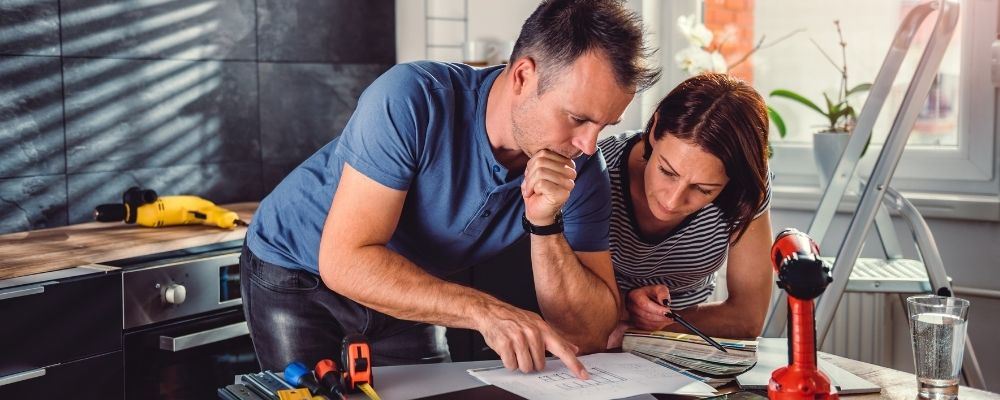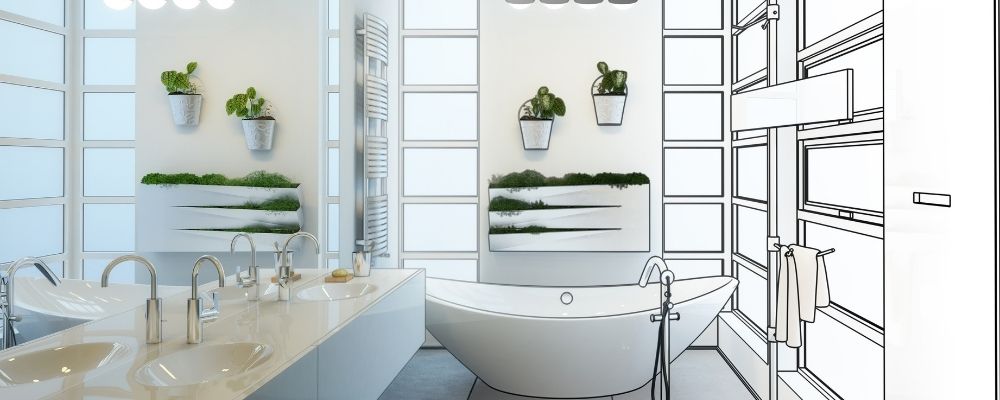Thinking of renovating your home? Well, you will likely need to take out a loan to finance your project. Here is a look at two of the most common ways to finance a home renovation: a personal loan vs home improvement loan.
Table of Contents
What is a Home Improvement Loan and How Does it Work?
A home improvement loan is a loan used for the express purpose of a home improvement project. Typically, it is a non-secured personal loan used to finance repairs, materials, labor, and any other costs associated with the construction project.
But a home improvement loan isn’t necessarily a particular financial product – it’s simply a loan that is being borrowed for the express purpose of home improvement. Therefore, there are a variety of both secured and unsecured loans you can choose from to finance your home renovation.
Other popular loans typically used for home improvement projects include:
- Home Equity loans
- Home Equity Lines of Credit (HELOC)
- Cash-Out Refinances
- HUD Title 1 Loans
Each different type of loan will have its own unique advantages and disadvantages. That’s why it’s important to have a clear goal in mind and shop around to get the best rate before committing to a particular product.
Home Improvement Loans Pros and Cons

If you have some equity built in your home, you may consider using a secured loan such as a HELOC or home equity loan to finance your renovation project. Here is a look at the pros and cons of this type of loan.
PROS:
- Lower interest Rates: Secured loans tend to offer lower interest rates than those that are unsecured because the lender can repossess the asset used as collateral if the borrower does not repay the debt.
- Lower Monthly Payments: The direct result of a lower interest rate is lower monthly payments. This can be a deal breaker for home owners that can tap into these type of loans.
- Higher Loan Amount: With a loan secured by a property (like home equity loans), you can typically tap into up to 85% of the home’s equity. So, if you’ve built up the equity, you can get access to more funds than you would with a personal loan.
- Tax Deductions: Interest rates on a secured loan can often be deducted from your taxes if used for the purpose of home improvement.
- Longer Loan Terms: Another key benefit is that a secured loan tends to have much longer loan terms than an unsecured loan. This can further reduce the monthly payment, in conjunction with the lower interest rate.
CONS:
- Risk of Repossession if You Default: The biggest risk of using a secured loan is that you could end up losing your home if you default on the loan. So, before you borrow, it’s important to have a solid plan of action and a budget for emergencies so you don’t get in over your head with construction costs.
- More Complex Application Process: Applying for a loan secured by a property is often more involved than an unsecured loan because the lender will have to confirm the value of the property, in addition to running your personal credit.
- Closing Costs: Just like a mortgage, a secured loan includes closing costs that will add to your overall debt, including loan origination fees, application fees, home inspection fees, etc.
Personal Loans Pros & Cons

The most common type of home improvement loan is an unsecured personal loan. Here is a look at some of the pros and cons of this type of financial product for home improvement projects.
PROS
- No Collateral Necessary: With a personal loan, you don’t have to put up any collateral, such as a home or automobile. So, if you default, it will still impact your credit, but you won’t lose your home in the process.
- Same Day Approval: The application process for personal loans is typically quick and painless. You can often get a decision the same day you apply.
- Predictable, Fixed Interest Rates: Personal loans often come with fixed interest rates, which means it’s easy to predict how much you will owe each month, so you can create a solid financial plan.
CONS
- Requires Good Credit: Personal loans are not secured by another asset, so you will have to have good credit to be approved with a decent interest rate.
- Higher Interest Rates: Interest rates for personal loans tend to be higher than those that are backed by collateral because they present more risk to the lender. To compensate for this added risk, the lender will charge you more in interest to hedge any losses in the event you default. This means higher fixed monthly payments for the duration of the loan terms.
- Origination Fees: Lenders typically charge what is called an origination fee to cover the costs of processing the application and underwriting the loan, which will be added to the total amount that you owe.
Should I Use a Personal Loan for Home Improvements?
Most people tend to use unsecured personal loans to finance home improvement projects because they are flexible and offer a fast application process. Although there are always consequences if you do not repay your debts, you won’t run the risk of losing your home if you default on a personal loan, unless you are forced to declare bankruptcy as a result.
But you may be able to save yourself some money in interest by getting a secured loan if you have the equity built and you feel confident about your ability to make payments on schedule. If you are on the fence about which type of loan makes the most sense, you should get a quote on interest rates and weigh the pros and cons.
Can You Use a Home Improvement Loan for Anything?
Typically, there aren’t any restrictions on what the money is used for as long as it is legal. But certain lenders have stricter requirements than others, especially if you are taking out a specific financial product such as a HUD Title 1 Loan, which is specifically for home improvement. Or if you are looking to deduct the interest from your taxes, you must prove that the money was used to improve the value of your home.
If you want to avoid overspending, it’s better to have a solid repayment plan already worked out before you borrow. So, it probably isn’t wise to use the same loan to pay for home improvements, as well as finance a wedding or your child’s college tuition. But ultimately, what you spend the money on is between you and the lender, so you’ll have to make that decision for yourself.
Which Option is Best?
Personal loans are best for those who are doing smaller home renovation projects that can be completed quickly. That way, the higher interest rates won’t be as big a concern, but borrowers will benefit from the quick application process and flexible loan terms of an unsecured personal loan.
Home improvement loans are best for those who are planning larger home improvement projects meant to increase the value of the home. Those with enough equity built will benefit from the lower interest rates if the project takes a while and can also take advantage of the tax benefits offered by a secured loan.
Ultimately, both types of loans will get the job done. So, you’ll have to consider the pros and cons of each to determine what makes the most sense for your home improvement project.



